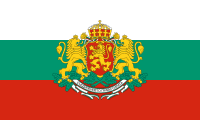List of Presidents of Bulgaria (1990-present)
| President of the Republic of Bulgaria
Президент на Република България | |
|---|---|
|
| |
| Style | His Excellency |
| Residence | Largo, Sofia |
| Term length | Five years, renewable once |
| Inaugural holder | Petar Mladenov |
| Formation | 3 April 1990 |
| Deputy | Margarita Popova |
| Salary | € 2,845.57 / $ 3,947.92 per month (March 2014) |
| Website |
www |
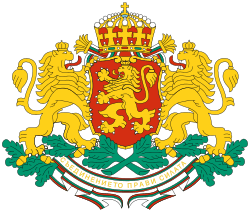 |
| This article is part of a series on the politics and government of Bulgaria |
|
Presidency |
|
The President of Bulgaria is the head of state of Bulgaria and the commander-in-chief of the Military of Bulgaria. The official residence of the President is at Boyana Residence, Sofia. After the completion of the second round of voting, candidate Rumen Radev was elected President of Bulgaria on 13 November 2016.
The president of Bulgaria's Head of State of the Republic of Bulgaria, which is among the state authorities. He is assisted by vice president.
As an institution President of Bulgaria has a number of functions and powers that are regulated in Chapter Four of the Constitution of the Republic of Bulgaria from 1991. President of the Republic is elected directly by the voters for a period of five years. The first president of the republic is elected Zhelyu Zhelev. Currently acting president, Rosen Plevneliev and his Vice President Margarita Popova.
In the Third Bulgarian State the functions of head of state are performed by the monarch (King and King), regency, and later by collective bodies as chairman of the interim presidency of the People's Republic, the chairman of the presidium of the National Assembly, Chairman of the State Council of the People's Republic Bulgaria. Forerunner of today's Presidential authority is the institution chairman (president) of the Republic (1990-1992).
History of institution
The story of the presidential institution in Bulgaria is relatively short and is associated with the reconstruction of the country after the fall of the communist regime in 1989. With the new structuring of the institutions in the context of the transition of Bulgaria to democracy and market economy, the presidential institution in Bulgaria became reality with the adoption of the new constitution on July 12, 1991. The first president of Bulgaria is a doctor of philosophy Zhelyu Zhelev. He won the presidential election of 1992 by direct vote, in accordance with the new constitution. His vice president was the poet Blaga Dimitrova.
The second presidential elections held in 1996 were won by Petar Stoyanov. He takes office on January 22, 1997, as his vice president Todor Kavaldzhiev. In 2001 Stoyanov run for a second term, but lost in the second round of Georgi Parvanov. Elections are held in November 2001. So for the third President of Bulgaria Georgi Parvanov was elected, and for his Vice President Angel Marin. They took office on 22 January of next year. The couple was re-elected in 2006. After the expiry of their second term, the second round of elections in 2011 was elected president Rosen Plevneliev and for his vice president Margarita Popova. They take an oath on January 19, 2012 and the inauguration of the 22nd the same month.
The salary that receives Bulgarian President is equal to two monthly salaries of MPs. So in March 2014 it amounted to 4614 Levs.
Choice
The choice of President of the Republic of Bulgaria is described in Article 93 of the Constitution of the Republic of Bulgaria. According to him, the president is elected directly by the people for a term of five years. It should be a Bulgarian citizen by birth, over 40 years can not be elected more than twice. Also president and vice president can not be MPs, any other state, public and economic activities and participate in the leadership of political parties.
Functions and powers
The functions and powers of the President are regulated in Chapter Four "President of the republic" of art. 92 incl. to Art. 104 incl., The Constitution of the Republic of Bulgaria. President:
gives and restores Bulgarian citizenship; appoint and dismiss senior government officials; exercise the right of pardon; forgive bad state receivables; supervise the legislative activity of the National Assembly by the right to a suspensive veto (the right to return to the National Assembly passed a law for further consideration); It is the supreme commander of the armed forces of Bulgaria; appoint heads of diplomatic and permanent missions of the Republic of Bulgaria in international organizations a proposal from the Council of Ministers. Election The president of Bulgaria has the right to schedule the elections for the National Assembly and local authorities. He set the date for a national referendum, following a decision of the National Assembly meeting.
Legislative Wiki letter w.svg This section is empty or stubs. You can help Wikipedia it expand. The president has no direct legislative power. However, he has the right to rule on any law it back for revision to the National Assembly. This is more popularly as the "veto", although it differs from the classical form veto anything there as the president of the United States. The President may, however, initiate amendments to the Constitution.
Representative The president represents the country in international relations. He has the right to sign international treaties in coordination with the Council of Ministers and without the need to express authorization.
Arbitration function Wiki letter w.svg This section is empty or stubs. You can help Wikipedia it expand. Serves to ensure normal relations between public authorities in the implementation of power.
Defense and security The President is the Supreme Commander of the Armed Forces of the Republic of Bulgaria. He appoints and dismisses the supreme command staff of the armed forces and the supreme officers into higher ranks on the proposal of the Council of Ministers. The President is the Chairman of the Consultative Council on National Security and have the power to:
declares war in case of armed attack against Bulgaria, or if necessary, by application of international agreements in the country; announces total or partial mobilization at the request of the Council of Ministers; declares martial law or any other public emergency when the National Assembly is not in session and can not be convened. Vice President The President is assisted by the Vice President. Vice President replaces the President in case of absence. Only upon early termination of office of the Vice President shall assume the duties of president until new elections. Vice no fixed own power. It acquires powers except if President assign part of their Article 98 of the Bulgarian Constitution. An example of this may be the appointment and dismissal of officials from the presidency; provision, rehabilitation, release and deprivation of Bulgarian citizenship; asylum and pardon of citizens.
"Vice President" in general is a rare institution in the world. In Bulgaria the position of vice president has accidentally created. The creation of this institution is one thoughtlessly copying the American experience at the start of democratic changes. However, the vice president can have an important function in protecting democracy. It makes it impossible usurpation of all power by the Prime Minister - for example by removing the president, assassination and so on. In this case, power would pass to the vice president, not the prime minister, controlled by its Chairman of the Parliament. It was only the third in succession.
Responsibility
The president can not be indicted - art. 103 when it violates the Constitution or amend the national interests of the country. The responsibility in these cases it can be held just before the Constitutional Court of Bulgaria, it can not on its own initiative. The accusation raised by the National Assembly and the conditions are laid down in Art. 103 par. 2 of the Constitution. There have been three attempts to accountability and removal of President Parvanov during his tenure.
Termination of office
Under the constitution, the mandate of the President is interrupted when:
Expiration of term; resignation before the Constitutional Court (For the history of the institution does not have such a case; the only commander, who can allegedly has resigned, is the president (chairman) Petar Mladenov); permanent inability to perform his duties due to serious illness; under Art. 103; (Impeachment: The only president who has been raised impeachment is Georgi Parvanov) death.
List of Presidents of Bulgaria
- Party legend
Bulgarian Socialist Party Independent Union of Democratic Forces GERB
| № | Portrait | Name (Birth–Death) |
Term of office / mandates | Prime Ministers | Previous post | Political alliance | ||
|---|---|---|---|---|---|---|---|---|
| 1 | 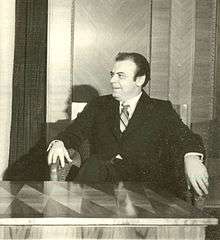 |
Petar Mladenov Петър Младенов (1936–2000) |
3 April 1990 |
6 July 1990 |
Andrey Lukanov (1990) | Chairman of the State Council of Bulgaria (1989-1990) | Bulgarian Socialist Party | |
| — | ||||||||
| — | 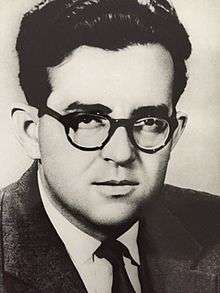 |
Stanko Todorov Станко Тодоров (1920–1996) |
6 July 1990 |
17 July 1990 |
Andrey Lukanov (1990) | Chairperson of the National Assembly (1981-1990) | Bulgarian Socialist Party | |
| acting as Chairperson of the National Assembly | ||||||||
| — |  |
Nikolai Todorov Николай Тодоров (1921–2003) |
17 July 1990 |
1 August 1990 |
Andrey Lukanov (1990) | Chairperson of the National Assembly (1990) | Independent | |
| acting as Chairperson of the National Assembly | ||||||||
| 2 | 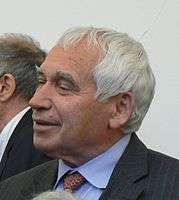 |
Zhelyu Zhelev Желю Желев (1935–2015) |
1 August 1990 |
22 January 1997 |
Andrey Lukanov (1990) Dimitar Popov (1990-1991) Philip Dimitrov (1991–1992) Lyuben Berov (1992–1994) Reneta Indzhova (1994–1995) Zhan Videnov (1995-1997) |
Chairman of the Union of Democratic Forces (1989-1990) | Union of Democratic Forces | |
| 1992 – 52.8%, 2,738,436 | ||||||||
| 3 | 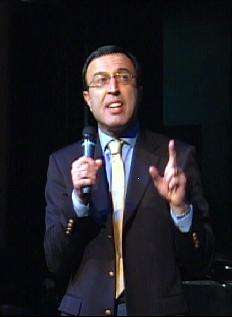 |
Petar Stoyanov Петър Стоянов (1952–) |
22 January 1997 |
22 January 2002 |
Zhan Videnov (1997) Stefan Sofiyanski (1997) Ivan Kostov (1997–2001) Simeon Sakskoburggotski (2001-2002) |
Vice Chairman of the Union of Democratic Forces (1995-1997) | Union of Democratic Forces | |
| 1996 – 59.7%, 2,502,517 | ||||||||
| 4 |  |
Georgi Parvanov Георги Първанов (1957–) |
22 January 2002 |
22 January 2012 |
Simeon Sakskoburggotski (2001-2005) Sergei Stanishev (2005-2009) Boyko Borisov (2009–2012) |
Chairman of the Bulgarian Socialist Party (1996-2001) | Bulgarian Socialist Party | |
| 2001 – 54.1%, 2,043,443
2006 – 75.9%, 2,050,488 | ||||||||
| 5 | 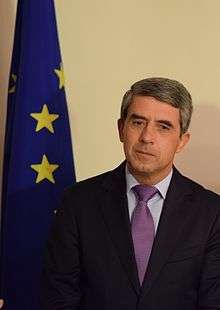 |
Rosen Plevneliev Росен Плевнелиев (1964–) |
22 January 2012 |
22 January 2017 |
Boyko Borisov (2012-2013) Marin Raykov (2013) Plamen Oresharski (2013–2014) Georgi Bliznashki (2014) Boyko Borisov (2014–resign) |
Minister of Regional Development and Public Works (2009-2011) | GERB | |
| 2011 – 52.6%, 1,698,136 | ||||||||
| 6 | 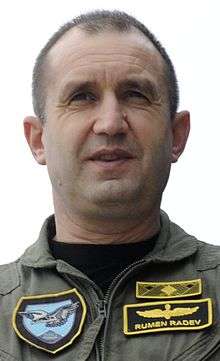 |
Rumen Radev Румен Радев (1963–) |
22 January 2017 |
President-elect | Bulgarian Air Force commander (2014-2016) | Independent supported Bulgarian Socialist Party | ||
| 2016 – 59.4%, 2,049,260 | ||||||||
Living former presidents
There are two living former Bulgarian Presidents:
| Image | Name | Term/Reign | Office | Date of birth |
|---|---|---|---|---|
 |
Petar Stoyanov | 1997–2002 | President of Bulgaria | 25 May 1952 |
 |
Georgi Parvanov | 2002-2012 | President of Bulgaria | 28 June 1957 |
See also
| Wikimedia Commons has media related to Heads of state of Bulgaria. |
- Politics of Bulgaria
- List of Bulgarian monarchs
- List of Bulgarian regents
- List of heads of state of Bulgaria
- List of Prime Ministers of Bulgaria
- List of First Deputy Chairmen of the State Council of Bulgaria
- Vice President of Bulgaria
- List of Heads of state of Bulgaria by longevity
- List of vice heads of state of Bulgaria by longevity
